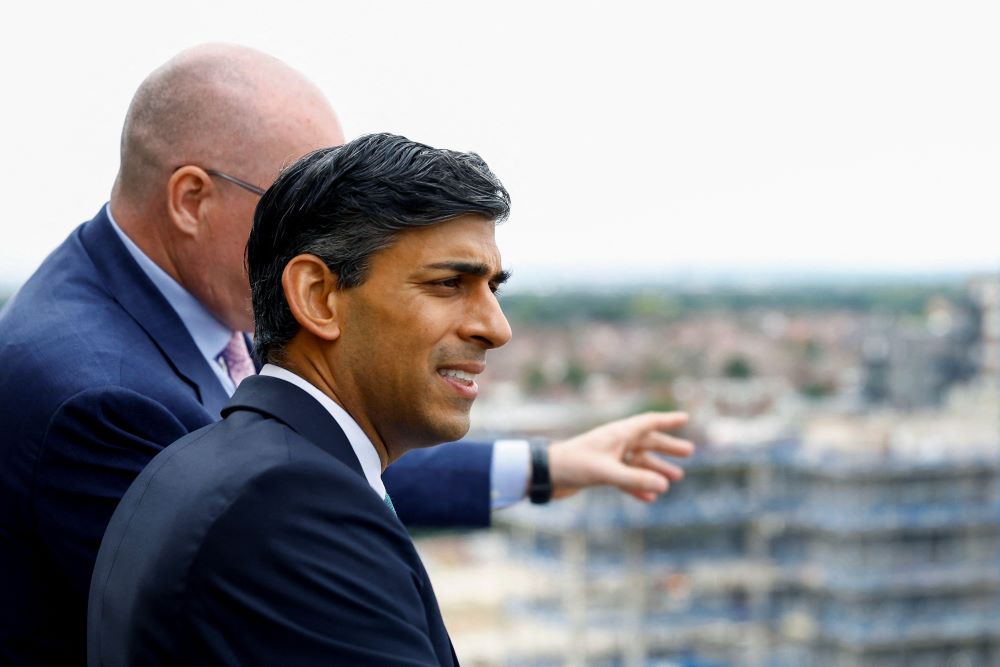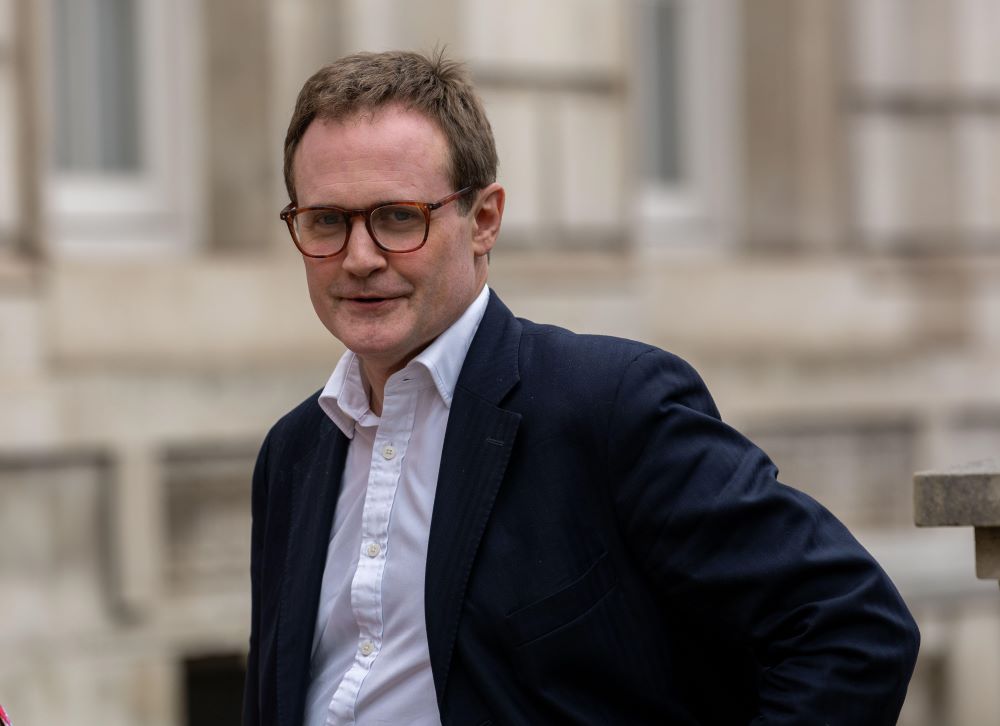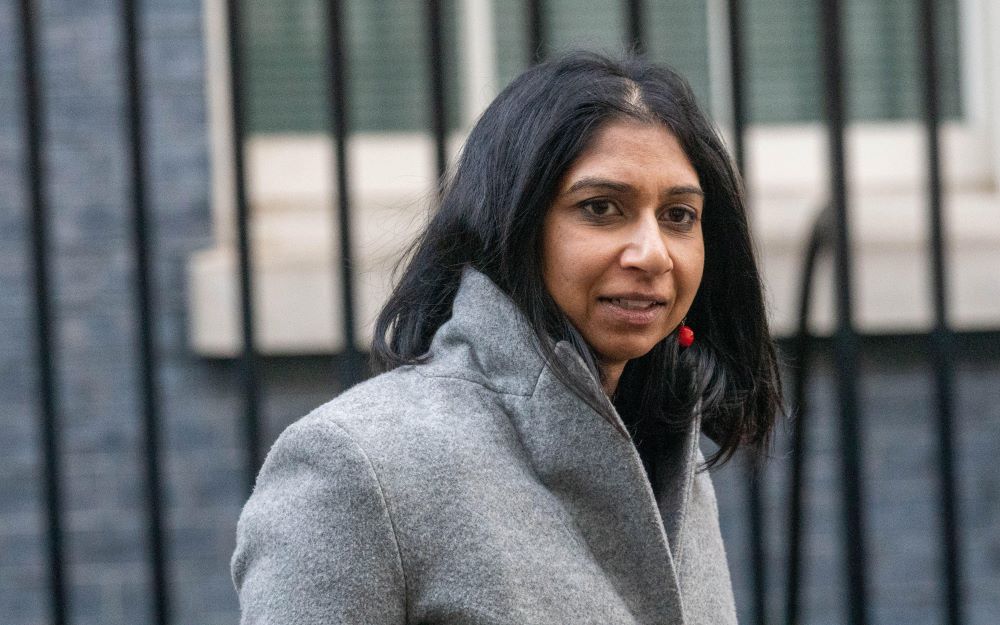Tory Moderates Are Gearing Up For A Major Comeback
One Nation Tory Tom Tugendhat launching his leadership bid last summer (AlamY
8 min read
Conservative MPs in the moderate 'One Nation' group have agreed to up their game and re-assert their influence, as concern grows at the centre of the party that Rishi Sunak's lurch toward right-wing rhetoric and policy positions could do more harm than good at the ballot box.
The One Nation caucus, home to the Conservatives' centre-ground MPs, was formed in early 2019 and originally chaired by former cabinet ministers Amber Rudd and Nicky Morgan, who remain influential figures in the world of self-styled moderate Conservatism. Damian Green, the veteran MP for Ashford, is the group's current chair.
Their socially liberal, environment-conscious and pro-Europe politics had been Tory orthodoxy since former prime minister David Cameron became party leader nearly 20 years ago. But Brexit, particularly Boris Johnson's unyielding approach to negotiations, demoralised the Europhile One Nation group, and divided its MPs over Johnson's unorthodox decision to prorogue parliament in pursuit of a hardline divorce from the EU. The move, later deemed unlawful, united a number of outraged One Nation Tories with furious opposition parties who accused Johnson of seeking to avoid scrutiny of his Brexit deal. This period of Tory civil war left the group "broken", admitted a former Cabinet minister.
With the One Nation group relegated to the sidelines of Tory politics, tribes elsewhere in the party including the European Research Group (ERG), of which staunchly pro-Leave Jacob Rees Mogg, Iain Duncan Smith and Priti Patel are members, Northern Research Group (NRG) and recently-formed New Conservatives, gained prominence.
But in recent weeks, the One Nation's 80-plus MPs, who by their own admission have not been much of a force in Westminster in the last few years, have grown restless and agreed they can no longer afford to be spectators as the beleagured Conservative party enters a critical period ahead of next year's general election. “[The One Nation caucus] really needs to find its voice in the parliamentary party again sooner rather than later," one former secretary of state told PoliticsHome.
With Johnson and some of his most ardent disciples such as Nadine Dorries either gone or going, and once highly-influential forces like the ERG diminished now the UK has left the EU, fortune may once again favour the moderates as they hatch a plan to get organised again.
“It needs harder edges, and it needs to make demands," another One Nation'er said.
In early September, moderate Tory MPs will assemble for a one-day, One Nation conference in London, their first gathering of this kind since 2019. While the Covid pandemic also contributed to the four-year hiatus, the forthcoming event is seen as a statement of intent by the Tory centre-ground as conversations about the future of the Conservative party get louder.
The conference will mirror the flagship Conservative party conference with keynote speeches and panel discussions, and will give One Nation MPs the chance to discuss what should be in the next Tory manifesto – which they are keen to influence. “It's clear that One Nation policies are both politically popular and in the national interest. Making that case loud and clear is in the interest of the Conservative party as a whole," said Boston and Skegness MP Matt Warman, who is a member of the group.

In June, Warman gave a presentation to fellow caucus members titled ‘Reasserting One Nation’, in which he argued that the Tory party's “ideological and numerical centre of gravity" is aligned with the group's values. He insisted that its members needed to be more forthright in championing One Nation perspectives on major talking points in the run-up to the next election.
As such, a change in strategy is in the works. The caucus is looking at creating a more professional media operation to help increase its visibility through opinion pieces, media interviews and One Nation events. In a bid to demonstrate a renewed a sense of purpose, an unusually large number of One Nation MPs attended the Tory Reform Group's recent summer reception in Westminster. The TRG is a non-parliamentary, centre-right organsiation with strong ideologically and professional ties with the One Nation group.
While One Nation Tories are at pains to stress that they will still be hugely supportive of the Sunak government, this forthright approach represents a shift for the group, which has refrained from public interventions in the last few years in an effort to avoid the appearance of confrontation favoured by groups such as the ERG.
“Because we're not mad and sit there ranting and raving like some other organisations do, we don’t get heard that much," said one former minister.
Another One Nation Tory said instead they intended to create a "drumbeat of positive messaging", rather than "picking fights with Miriam Cates every time she says something old school [about] family". Cates has been viewed as a rising star of the right since she was elected in 2019 as MP for Penistone and Stocksbridge, but her staunch socially conservative views on working mothers and gender identity, among other things, are often in stark contrast with liberal opinions held by moderate Tories.
One Nation circles regard Cameron's 2013 legalisation of same-sex marriage in the face of fierce resistance from much of the party as one the Conservatives' greatest achievements, and believe they must continue to promote socially progressive values if they are to appeal to younger voters. Currently the party is losing support among every age group other than the over-65s.
There is also a belief that having One Nation Conservatives around the Cabinet table is the best way of ensuring centre-ground arguments are being put forward at the highest level. Jeremy Hunt (chancellor), Tom Tugendhat (security minister) and Alex Chalk (justice secretary) are seen as group representatives in the Sunak regime, as well as up-and-coming MPs like junior minister Claire Coutinho, who is a close ally of the PM.

Elsewhere in the Tory party, however, there are figures who argue that while the One Nation caucus can try to become more organised, it also needs to establish a clearer sense of what it actually stands for other than being further to the left than other Conservative MPs on social issues, and they say there are differences in opinion among its members when it comes to economic policy.
An issue the caucus is less publicly forthright about, but is equally pertinent as the Conservatives continue to flail behind Labour in the polls, is what sort of direction the party takes if it loses the next general election. Who will replace Sunak as leader with the party in opposition is an urgent question for One Nationers who see it as their job to resist any efforts to pull the party further to the right in the event of defeat.
An ex-secretary of state feared it would be unlikely that they would elect a leader from the centre ground if they did lose the election in 2024, predicting that the party membership would clamour for a figure from the right like Home Secretary Suella Braverman. "I suspect the party won’t be in the mood for moderation," they told PoliticsHome.
But One Nation MPs say that at the very least they need an agreed candidate who can represent the centre-right cause in a leadership contest, and act as a moderating force if the party does move closer to its fringes. Tugendhat, who ran to replace Johnson last summer, is currently seen as the Conservative MP most likely to receive the group's collective backing. The former army officer finished fifth in last year's contest, with his fellow MPs opting for a final four boasting more ministerial experience, but he was always seen as having very little chance of winning with a Tory party membership keen on a leader further to the right. Liz Truss was their choice in the end.
"In any eventuality, there has got to be a One Nation group that holds the party leadership to account. It's got to be a strong force, potentially against a very right-wing Tory party under Suella," another ex-Cabinet minister who sits in the group told PoliticsHome.

The last time the One Nation caucus was truly organised was in the summer of 2019, when the Tory party leadership contest to replace former prime minister Theresa May got underway. While May wasn't in the group, she had the support of many moderate Tories having been ousted by the fervent Brexiteers over the terms of her withdrawal agreement with the EU.
The group was first out of the traps to organise a hustings in parliament, and MPs who were present say their effort to put the One Nation cause on the agenda played a key part in senior moderate Tories like Morgan, Rudd and Robert Buckland being in Johnson's first Cabinet.
Johnson's decision to appoint the trio was seen as his way of reaching out to the moderate bloc and making sure it felt represented, but his highly-contentious approach to delivering Brexit left the group feeling that he was never really one of them. As one senior moderate put it: "Boris said: 'I am One Nation, now fuck off'." Rudd resigned as secretary of state for work and pensions just a few months later in protest against his Brexit policy.
The question now is whether the One Nation caucus can succeed in being more influential this time around. According to Scarlett Maguire, Director at polling firm JL Partners Polls, the massive electoral challenge facing Sunak in avoiding defeat by Starmer at the next general election means he is more likely to shift to right-wing positions than embrace the group's centrist proposals.
Downing Street has already gone full tilt on attacking Labour, a source of tension among backbench Tory moderates.
Maguire told PoliitcsHome it was likely such a tactic was being employed because the number of voters who backed the Conservative party at the 2019 general election, but say they are undecided how they will vote next time, is currently estimated to be around 40 per cent. This group is more likely to hold strong, socially conservative views on issues like migration, and Sunak appears to have gone all in on retaining their support.
“The government will be looking at that group and thinking 'what appeals to them?’," she continued. "What appeals to those voters is quite different to what parts of the One Nation group espouses."
